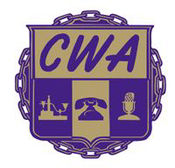 With continued inaction at the Federal Communications Commission, some stakeholders in the Net Neutrality debate continue to file comments with the Commission trying to find a “third way” to bring about guarantees for online free speech and access while softening opposition to “network management” technology that allows providers to manipulate broadband traffic.
With continued inaction at the Federal Communications Commission, some stakeholders in the Net Neutrality debate continue to file comments with the Commission trying to find a “third way” to bring about guarantees for online free speech and access while softening opposition to “network management” technology that allows providers to manipulate broadband traffic.
Among such filers is the Communications Workers of America, which seeks a “middle-ground approach” to protecting a free and open Internet.
The CWA has always maintained its feet in two camps — with consumers looking for improved broadband and with the communications companies that employee large numbers of the union’s members, who will build out those networks and provide service.
The union shares our annoyance with FCC Chairman Julius Genachowski for his complete inaction on broadband policy thus far. In short, the Commission keeps stalling from taking direct action to reclassify broadband as a telecommunications service, restoring its ability to oversee broadband policy lost in a federal appeals court decision earlier this year.
The CWA used a piece by David Honig from the Minority Media and Telecommunications Council (MMTC) to echo its own position:
MMTC isn’t alone in being frustrated with the FCC’s disappointing attitude toward real action this past year. In a recent interview with the Wall Street Journal, FCC Chairman Julius Genachowski expressed impatience with the glacial pace of policymaking at his Commission. Although he mentioned that the FCC, under his direction, has implemented some notable reforms, he conceded that “there is still a lot to do.”
Unfortunately, regardless of how earnest the Chairman is in his desire to move forward with the business of policymaking, his actions speak much louder than his words. Indeed, his yearlong pursuit of network neutrality rules — first via a traditional rulemaking proceeding and, most recently, via an effort to reclassify broadband as a telecommunications service — has cast a long and almost suffocating pall over many of the items that the Chairman wishes to act upon. His inaction on civil rights issues — especially EEO enforcement — is just one example of how paralyzed the agency has become.
Recent news that Congress will not move forward to address the regulatory questions that currently vex the Commission (e.g., whether the FCC has authority to regulate broadband service providers) could embolden the Chairman to adopt the sweeping regulatory changes for broadband that he proposed earlier this year. Doing so in the absence of Congressional action would only invite immediate legal challenges that would mire the FCC in litigation, appeals, and remands for years to come.
To put it plainly, the FCC is stuck. Although it recently adopted some promising orders related to broadband (e.g., new rules for accessing new portions of wireless spectrum called “white spaces” and for enhancing access in schools and libraries), the Commission has failed to move forward with implementing core provisions of its monumental National Broadband Plan.
 The union last week also submitted its latest round of comments requested by the Commission, this time to broaden its position on a proposed compromise. We’ve delineated which of the proposals we believe are primarily pro-consumer (in green), pro-provider (red), and which fall straight down the middle (blue):
The union last week also submitted its latest round of comments requested by the Commission, this time to broaden its position on a proposed compromise. We’ve delineated which of the proposals we believe are primarily pro-consumer (in green), pro-provider (red), and which fall straight down the middle (blue):
- First, wireline broadband Internet access providers (“broadband providers”) should not block lawful content, applications, or services, or prohibit the use of non-harmful devices on the Internet.
- Second, wireline and wireless broadband providers should be transparent regarding price, performance (including reporting actual speed) and network management practices.
- Third wireline broadband providers should not engage in unjust or unreasonable discrimination in transmitting lawful traffic.
- Fourth, broadband providers must be able to reasonably manage their networks through appropriate and tailored mechanisms, recognizing the technical and operational characteristics of the broadband Internet access platform.
- Fifth, the Commission should take a case-by-case adjudication approach to protect an open Internet rather than promulgating detailed, prescriptive rules.
The first and third principles are strongly pro-consumer, although as we’ve seen, providers have a tendency to want to define for themselves what is “harmful,” “unjust,” or “unreasonable” and impose it on their customers. We’ve seen provider-backed front groups argue that the concept of Net Neutrality itself is all three of these things. Any rules must be clearly defined by the Commission, not left to open interpretation by providers.
The second principle cuts right down the middle. Consumers deserve an honest representation of broadband speeds marketed by providers (not the usual over-optimistic speeds promised in marketing materials), and transparency in price — especially with gotchas like term contracts, early cancellation penalties, overlimit fees, etc. But providers can also go to town with abusive network management they’ll market as advantageous and fair, even when it is neither. Just ask customers of Clear who recently found their “unlimited” wireless broadband service, marketed as having no speed throttles, reduced in speed to barely above dial-up when they used the service “too much.” Clear says the speed throttles are good news and represent fairness. Customers think otherwise, and disclosure has been lacking.
The fourth and fifth principles benefit providers enormously. Network management itself is neither benevolent or malicious. The people who set the parameters for that management are a different story. A traffic-agnostic engineer might use such technology to improve the quality of services like streamed video and Voice Over IP by helping to keep the packets carrying such traffic running smoothly, without noticeably reducing speeds and quality of service for other users on that network. There is nothing wrong with these kinds of practices. There is also nothing wrong with providing on-demand speed boosts on a pay-per-use basis, so long as the network is not oversubscribed.
But since providers are spending less to upgrade their networks, providers may seek to exploit these technologies in a more malicious way — too stall needed upgrades and save money by delivering a throttled broadband experience for some or all of their customers. If customers can be effectively punished for using high bandwidth applications, they’ll reduce their usage of them as well. That’s good for providers but not for customers who are paying increasing broadband bills for a declining level of service.
Some examples:
- Customers using high bandwidth peer-to-peer applications can have their speeds throttled, sometimes dramatically, when using those applications;
- Internet Overcharging schemes like usage caps, overlimit fees, and “fair access” policies can discourage consumers from using services like online video, file transfer services, and new multimedia-rich online gaming platforms like OnLive, which can consume considerable bandwidth;
- Preferred content can be “network managed” to arrive at the fastest possible speeds, at the cost of other traffic which consequently must be reduced in speed, meaning your non-preferred traffic travels on the slow lane;
- Providers can redefine levels of broadband service based on intended use, relegating existing packages to “web browsing and e-mail” while marketing new, extra-cost add-ons for services that take the speed controls off services like file transfer and online video, or changes usage limits.
It is remarkable the CWA seeks to allow today’s indecisive Commission to individually adjudicate specific disputes, instead of simply laying down some clear principles that would not leave a host of loopholes open for providers to exploit.
Big players like Comcast, AT&T, and Verizon have plenty of money at their disposal to attract and influence friends in high places. If the Commission thought Big Telecom’s friends in Congress were breathing down its neck about telecom policy now, imagine the load it will be forced to carry when these companies seek to test the Commission’s resolve.
Opponents of Net Neutrality claim broadband reclassification will leave providers saddled with Ma Bell-era regulation. But in truth, the FCC can make their rules plain and simple. Here are a few of our own proposals:
- Network management must be content-agnostic. “Preferred partner” content must travel with the same priority as “non-preferred content;”
- Providers can use network management to ensure best possible results for customers, but not at the expense of other users with speed throttles and other overcharging schemes;
- Providers can market and develop new products that deliver enhanced speed services on-demand, but not if those products require a reduction in the level of service provided to other customers;
- Customers should have the right to opt out of network management or at least participate in deciding what traffic they choose to prioritize;
- Providers may not block or impede legal content of any kind;
In short, nobody objects to providers developing innovative new applications and services, but they must be willing to commit to necessary upgrades to broaden the pipeline on which they wish to deliver these services. Otherwise, providers will simply make room for these enhanced revenue services at your expense, by forcing a reduction in your usage or reducing the speed and quality of service to make room for their premium offerings.
The industry itself illustrates this can be done using today’s technology.
The cable industry managed to accomplish benevolent network management with products like “Speed Boost” which delivers enhanced, short bursts of speed to broadband customers based on the current demand on the network. Those speed enhancements depend entirely on network capacity and do not harm other users’ speeds.
Groups like the CWA need to remember that compromise only works if the terms and conditions are laid out as specifically as possible. Otherwise, the player with the deepest pockets and closest relationships in Washington will be able to define the terms of the compromise as they see fit.
And that’s no compromise at all.
[flv width=”480″ height=”380″]http://www.phillipdampier.com/video/CWA Larry Cohen on the Open Internet Jobs and the Digital Divide 9-14-10.flv[/flv]
Communications Workers of America president Larry Cohen outlined the union’s position on Net Neutrality before the Congressional Black Caucus Institute on Sept. 14, 2010. (2 minutes)


 Subscribe
Subscribe







